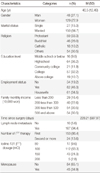Abstract
Purpose
This study was to identify the symptom severity, interference and their psychological predictors in thyroid cancer patients hospitalized for radioactive iodine administration.
Methods
One hundred seventy-seven thyroid cancer patients admitted to the isolation room for Iodine (I131) therapy were recruited. Subjects were asked to complete the questionnaire on core symptoms, thyroid cancer symptoms, interference, depression and state anxiety in the evening after receiving radioactive iodine therapy. Data was analyzed using frequency, percentage, mean, Pearson's correlation, and multiple regression with SPSS vs. 19.
Results
Lack of appetite, drowsiness, sleep disturbance, fatigue, and nausea were the 5 most core symptoms. More than 20% of patients experienced moderate to severe thyroid cancer symptoms including feeling cold, hoarseness, swallowing difficulty, and feeling hot. More than 30% of subjects experienced moderate to severe interferences in mood, general activity, and 22% in walking. Depression and state anxiety were identified as predictors of core symptoms, thyroid symptom severity and interference.
References
1. The Korea Central Cancer Registry, National Cancer Center. Annual report of cancer statistics in Korea in 2009, Ministry of Health and Welfare. Accessed August 20, 2012. http://ncc.re.kr/manage/manage03_033_view.jsp?bbsnum=229&hSelSearch=&hTxtKeyword=¤t_page=1&cd=null.
2. Hong SW. Radioactive therapy for differentiated thyroid caoncer. Korean J Nucl Med. 2000. 34:265–275.
3. National Cancer Center. Cancer related information. Accessed October 20, 2012. http://ncc.re.kr/hospital/hospital10.jsp?cancer_kind=1190413_2853.html.
4. Park SG. Effective half-life of I-131 in patients with differentiated thyroid cancer treated by radioactive I-131. Nucl Med Mol Imaging. 2008. 42:464–468.
5. Tagay S, Herpertz S, Langkafel M, Erim Y, Bockisch A, Senf W, et al. Health-related quality of life, depression and anxiety in thyroid cancer patients. Qual Life Res. 2006. 15:695–703.

6. National Cancer Institute. What you need know about thyroid cancer. Accessed October 20, 2012. http://www.cancer.gov/cancertopics/wyntk/thyroid/page7#iodine.
7. Son SM. The effect of information supporting program on the decrease of patient's psychological and physical discomfort in radiological iodine therapy [dissertation]. 2005. Seoul: Korea Univ..
8. Gning I, Trask PC, Mendoza TR, Harle MT, Gutierrez KA, Kitaka SA, et al. Development and initial validation of the thyroid cancer module of the M. D. Anderson Symptom Inventory. Oncology. 2009. 76:59–68.

10. Lee JI, Kim SH, Tan AH, Kim HK, Jang HW, Hur KY, et al. Decreased health-related quality of life in disease-free survivors of differentiated thyroid cancer in Korea. Health Qual Life Outcomes. 2010. 8:101.

11. Kirkova J, Rybicki L, Walsh D, Aktas A. Symptom prevalence in advanced cancer: age, gender, and performance status interaction. Am J Hosp Palliat Care. 2012. 29:139–145.
12. Kim YS, Kim SG, Kim KR. Effects of the information providing program of I131treatment on the anxiety and immune response of patients with thyroid cancer. J Korean Oncol Nurs. 2006. 6:152–161.
13. Chon KK, Choi SC, Yang BC. Integrated adaptation of CED-D in Korea. Korean J Health Pychol. 2001. 6:59–76.
14. Hahn DW, Lee CH, Chon KK. Korean adaptation of Spielberger's STAI (K-STAI). Korean J Health Psychol. 1996. 1:1–14.
15. Cleeland CS, Mendoza TR, Wang XS, Chou C, Harle MT, Morrissey MM, et al. Assessing symptom distress in cancer patients; The M. D. Anderson symptom inventory. Cancer. 2000. 89:1634–1646.
16. Dodd MJ, Miaskowski C, Paul SM. Symptom clusters and their effect on the functional status of patients with cancer. Oncol Nurs Forum. 2001. 28:465–470.
17. Park EY, Yi M. Development and effectiveness of expressive writing program for women with breast cancer in Korea. J Korean Acad Nurs. 2012. 42:269–279.

18. Chun N, Kim SH. The effects of hand massage on comfort in women with gynecologic cancer undergoing chemotherapy. J Korean Oncol Nurs. 2010. 10:88–94.
19. Hong MS, Cho MJ. The effects of music therapy on pain, depression and anxiety in terminal cancer patients. J Korean Oncol Nurs. 2010. 10:112–118.
20. So HS, Yoon JH, Moon JD. Changes on the physical functionings for women with mastectomy over the period of aerobic dance. J Korean Oncol Nurs. 2002. 2:17–26.
21. Chun N. Structural equation model on sexual function in women with gynecologic cancer. J Korean Acad Nurs. 2008. 38:639–648.

22. Chung BY, Yu X, Lee EH. Symptom experience, mood disturbance, & social support in breast cancer patients undergoing radiotherapy. J Korean Oncol Nurs. 2006. 6:172–180.




 PDF
PDF ePub
ePub Citation
Citation Print
Print






 XML Download
XML Download